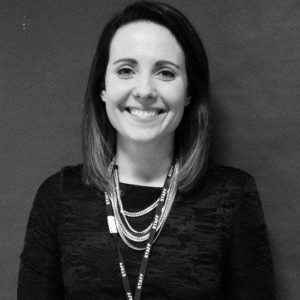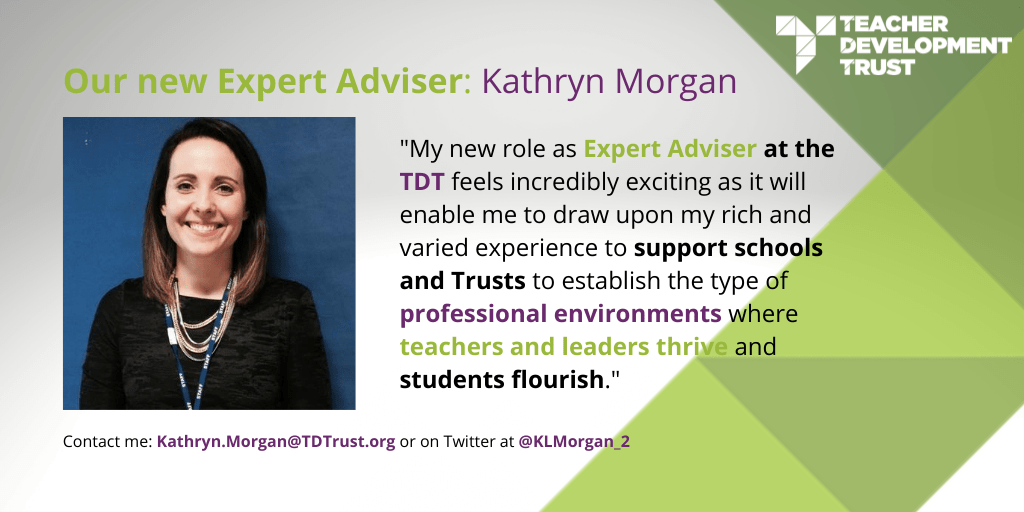The Teacher Development Trust is delighted to announce that Kathryn Morgan (@KLMorgan_2) has joined us as our new Expert Adviser. In this blog, she shares some reflections on why the leadership of professional learning is so vital for education.
My new role as Expert Adviser at the Teacher Development Trust feels incredibly exciting as it will enable me to draw upon my rich and varied experience to support schools and Trusts to establish the type of professional environments where teachers and leaders thrive and students flourish. I’m looking forward to working with schools and Trusts to help them create buzzing, research-rich staffrooms where a powerful culture of professional learning underpins successful school improvement.
My experience to date has taught me that culture is paramount to the success of any school and at the centre of this is trusting relationships. How do we ensure that we have schools where colleagues are enthusiastic and motivated to work together to develop their practice? How do we create the type of culture that fuels both self and collective efficacy? Two aspects that I believe are central to achieving this is effective leadership and professional conversations. I am an avid reader of Viviane Robinson’s work on school leadership and her model for open to learning conversations. You can find out more about this on the researchEd home channel here .
I knew that when I finished my PGCE, having been placed in a variety of inner city Birmingham schools, that I wanted to continue to serve the most disadvantaged communities, not because of some sort of saviour complex but because I fiercely believe in a fairer society and I am determined to play my part. I began teaching in 2006 in a primary school in North Solihull – a school in need of a lot of love after a series of less favourable local authority reviews and Ofsted visits.
We worked hard to ensure that the provision in year 5 was as good as it could be. When Ofsted finally came, we were incredibly proud that our year group was regarded as displaying the strongest practice in the school. We both ended up having a long debrief with the lead inspector who was keen to learn more about how my year group partner was supporting my development; the self-directed CPD we were engaging with and the difference this support had made to my initial feeling of despair. I remember to this day that the lead inspector said to me in my feedback that: “You improve a school not through policy but through developing practice and to do that you need to have really excellent CPD. It is all about investing in staff.” I was one year into my teaching career and I had already experienced the transformative power of peer collaboration yet I knew that this was only the tip of the iceberg.
Eager to continue to develop, I joined a very successful three form entry junior school also in north Solihull. The Headteacher wanted her team to have the expertise to respond with confidence to the varying needs of the children and had established an environment where each teacher was committed to developing their day-to-day practice. Looking back now, those four years established the most secure foundations to my teaching practice and it taught me just how important leadership and a culture, to quote Mary Myatt, of ‘high challenge, low threat’. She made it her responsibility to ensure that the behaviour for learning, for students and adults, was as effective as it could. Teachers were able to teach and, as a result, students consistently accessed high quality learning experiences.
With six tough years of teaching under my belt I was even more keen to develop my practice by continuing to put myself in the most challenging of contexts. I joined a large, four-form entry primary school in Birmingham, leading on maths and coaching. The school was part of John Hattie’s Visible Learning pilot, which further afforded me the opportunity to engage with research and evidence informed practice. Understanding meta-analysis and taking the time to really reflect upon the impact of my day-to-day practice was a dream come true. I spent two years applying my middle leadership expertise that I had honed from my previous school to a new school context, using the many mistakes that I inevitably made as an opportunity to learn and understand more about the impact of a change of culture and climate. In addition to this, this experience taught me about how important it is, with limited time and resource, for us to make sure that we focus on the things that will have the greatest impact rather than leaving it to chance.
From here I made the bold leap into Assistant Headship and took up a post once again in North Solihull, leading on maths and the pupil premium provision. Working with the new Headteacher, Nicole Fowles, I became the deputy head for teaching, learning and curriculum with the overarching responsibility for professional learning and development. Nicole’s leadership was truly a breath of fresh air and under her expert guidance, I was given the trust to establish the type of professional learning culture where the whole team flourished, from teachers to teaching assistants, to the office staff and site team. We made the bold decision to recalibrate the school by putting professional learning and development at its heart. Our guiding question was: how can we create the type of school culture and environment where teachers keep improving?
A membership with the Teacher Development Trust afforded us the opportunity to draw upon invaluable expert support and challenge from David and the team. The audit process provided a comprehensive and objective analysis of our CPD provision, delving into our perceived effectiveness of our approach and bringing breadth and depth to our evidence base. The initial audit really was transformational, adding rigour to our self-reflection in each of the framework’s seven core areas:
- Culture and Wellbeing
- Focus
- Needs Analysis and Evaluation
- Internal Support and Challenge
- Use of Expert Knowledge
- Processes and structures of CPD
- Research, Innovation and Evidence
I left Coleshill Heath School having secured a silver audit and it fills me with huge pride that the team have recently secured the gold award as it is testament to serious hard work and a collective endeavour to unleash the potential in every member of the team.
Keen to further develop my expertise, I took on the role of Director of Professional Learning and Development at the Prince Albert Community Trust. The PACT is a very successful multi-academy trust, which has grown from a tight-knit group of colleagues. They were already innovative in their approach to teaching and learning but required the systems and processes to ensure that this could come under robust scrutiny of impact and also be scaled up as the trust grew. I was incredibly fortunate to have the mentorship of Vivienne Porritt during this time, as we worked together on a trust-wide impact approach. This refined my approach to need analysis and added clarity to understanding the difference that needed to be made and what knowledge, skills or behaviours colleague’s needed to develop in order to have this impact. You can find out more about this work on the Chartered College of Teaching website here .
After a fast and furious two years at the PACT, I came to a crossroads and considered moving into a Head of School position. However, my passion lies in understanding as much as I can about effective professional learning and development and supporting schools to harness the collective capacity and expertise of their teams. Therefore, I took on another invaluable role at Ambition Institute so that I could learning more about instructional learning design. This opportunity provided significant insight into how to assess and apply relevant scientific literature, learning science research and proven learning techniques to design training in a way that will enable teachers and leaders to keep getting better in a measurable and sustainable way. Always keen to develop adaptive expertise, I have recently taken on a Trustee role at refugeeEd where I am designing the induction and development programme for new volunteers. This has afforded me the opportunity to deepen my expertise with both instructional design and evaluation.
We are truly blessed to be more evidenced informed than we have ever been before. However, with this comes the need to interrogate research through the lens of our school context, remembering that there are no silver bullets. There is often robust debate over which we should value more, evidence or experience. Is wisdom derived from experience more or less valid than data produced from controlled research? Personally I believe there is a need for us to blend the smart and the heart to ensure that students receive a high quality education and learning experience. To quote the master that is Professor Dylan Wiliam, “No-one cares how much you know until they know how much you care.” I look forward to working with you – contact me at Kathryn.Morgan@TDTrust.org and follow me on Twitter at @KLMorgan_2.


